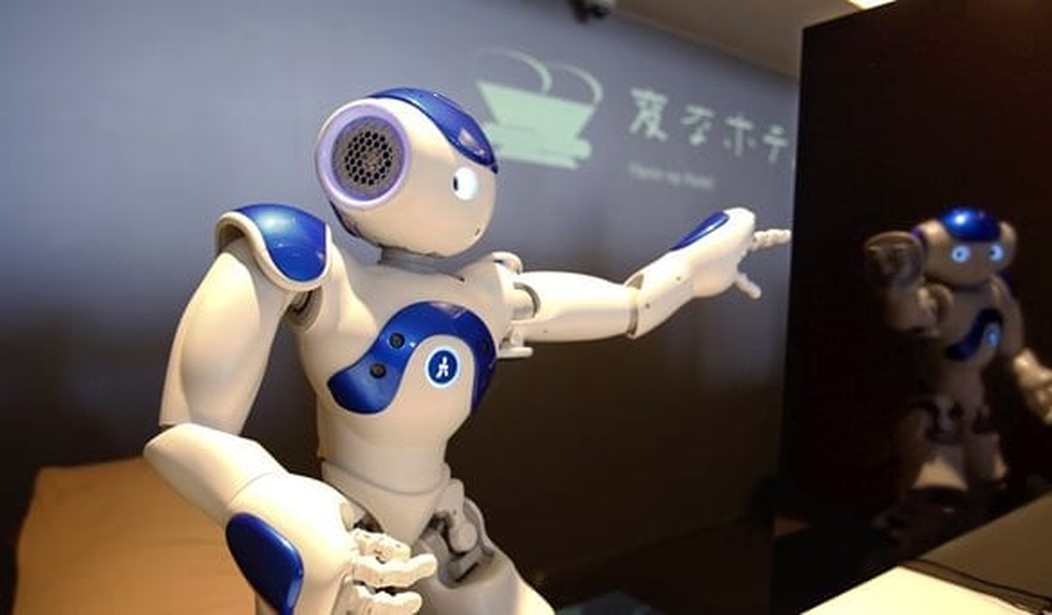High technology is changing all of our lives, mostly for the better. I sit here as a great example; when I was a young man, being a journalist meant having a desk in some office somewhere, banging out your stories, columns, and editorials on a typewriter. (I still have my old Smith-Corona around here somewhere.) If you were on the national level, your office would likely have been in a high-rise in New York, Chicago, or some other major city. Now, though, I sit here in my office on a plot of woods in Alaska, reaching out to all you readers across the fruited plain. That's the wonder of this amazing modern age we live in.
Artificial intelligence, though - AI - that's a more perplexing issue. We seem to be running away with development, in no small part because China, the United States' primary geopolitical rival, is doing likewise. President Trump seems determined that we will take and keep the lead in this AI arms race.
But there are still a lot of questions I'd like to see answered before we all get too carried away. Most of all, this whole thing about the "singularity," and the ultimate question: Will we ever be able to upload your brain? If we can, what will that be? Science writer Eric Sanchez has some thoughts.
Brain uploading, also known as mind uploading or whole-brain emulation, involves creating a digital replica of the human brain. To achieve this, scientists would need to map the intricate network of neurons, synapses, and electrical activity that make up our minds. The goal is to replicate not just the physical structure of the brain but also the dynamic processes that give rise to consciousness, memory, and emotion. Accomplishing this would require breakthroughs in neuroscience, computational modeling, and materials science.
Note that term: A digital replica. That's important. And noting that this would require "breakthroughs" is a pretty impressive understatement. This would require a major revolution in how we understand the human brain.
Here's the onion:
Perhaps the most contentious aspect of brain uploading is the question of consciousness. Even if we could create a perfect digital replica of a brain, would it be conscious? Would it experience the world in the same way as the biological brain it was modeled after? These questions touch on the deep mysteries of consciousness, which remain poorly understood despite decades of scientific study.
Some philosophers and neuroscientists argue that consciousness arises from the brain’s physical processes and could, in theory, be replicated in a digital medium. Others contend that consciousness is inherently tied to the biological substrate of the brain and cannot be transferred to a machine. This debate is far from settled, and the answer has profound implications for the feasibility and ethical considerations of brain uploading. Could a digital mind truly feel joy, fear, or love? Or would it be a lifeless replica, incapable of subjective experience?
This will require a measure of omphaloskepsis.
Now, I'm not a neurologist or an expert in AI. I am a biologist, by education, and I do know a few things about brains. And here's the thing: We do not really know what consciousness and self-awareness are. There is no structure we can point to in the brain and say, "See, that's where your personality is. That's the part of the brain that holds consciousness. That's the part that makes you self-aware." We just simply lack that knowledge. We presume it's in our huge cerebrums, something rather unique to humans, but we don't know for sure how it works.
And that brings us to the second layer of this problem: Assuming we develop the technology to completely map a human brain, to make a copy of that map, and to upload it to a file server, and assuming you were to, in your final hours due to age or illness, to agree to be uploaded as a last resort - it won't be you. Whatever it is that makes us conscious, whatever it is that makes us self-aware, whatever it is that makes us human will be dead. Gone. What will remain will only be a copy.
See Also: The AI Problem No One Is Talking About
What Frightens Me More Than the 'Dead Internet Theory'
Such a copy would no more be you or me than a photograph hanging on the wall.
Some will claim that it could bring comfort to a family, to be able to bring up an image of Grandpa on a laptop or a tablet, to talk with it, to hear it say things Grandpa might have said. But that's a false comfort; it's a distraction from the fact that we all have to face the end. Grandparents die. Parents die. We go through life on a wheel that never stops turning, part of that turning involves losing loved ones, and if you ask me, it's not healthy to try to evade that. It's a species of denial. To some extent, it's understandable; I would give a lot to be able to spend one hour with my father again. But I can't. That's reality. I've accepted it. These are things we all must accept.
This is a road that people should think long and hard about before proceeding. But, as a species, we aren't very good at paying attention to a key rule: Just because we can do a thing doesn't necessarily mean that we should do a thing.















